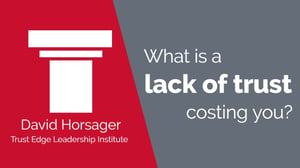 Everything of value is built on trust.
Everything of value is built on trust.
There were many great speakers and presentations at the Atlanta ScaleUp Summit.
David Horsager, author of The Trust Edge topped me and my customers list.
What is a lack of trust costing your organization?
Examples like VW, and Tiger Woods (who lost $122M in just two weeks when he lost the public and his sponsors trust) remind us how important trust is.
Horsager’s presentation offered many ideas and reasons we need to be better at building trust.
WHY IS TRUST SO IMPORTANT?
What’s the definition of Trust?
Let’s start with a definition of Trust - a Confident belief in a person, product or organization.
This visual explains what happens when Trust increases/decreases.
.jpg?width=338&name=Trust%20Increases%20(Trust%20Edge).jpg) Why trust is so important?
Why trust is so important?
Here’s the Number One reason people want to work for an organization. (Here’s a clue, it’s ahead of money)
- Trusted Leadership
9 out of 10 Americans will not refer the products or services of an organization they don’t Trust.
How can you gain more trust if you’re a leader?
Admit when you make a mistake.
92% of people would trust their senior leader more if they would be Transparent about their MISTAKES.
David Horsager’s Trust Building Story
Horsager shared a story about his teenage daughter. He asked her what was wrong when he noticed she was feeling down.
Her answer Illustrates how she views him, and how possibly your staff views you.
“Dad you wouldn’t understand, you’re perfect,” she’d responded.
He started going for walks with her every night when he’s home. His intention? To shares with her all the times, he’s made mistakes in his life, including businesses he started and lost, mistakes he’d made in school, life, and more.
LACK of Trust is your biggest Expense.
What is a lack of trust costing your team?
Repeatedly Horsager reinforced and asked this question.
The audience was asked what lack of trust costs. The responses included:
Time, Productivity, churn, resources, retirement, growth, efficient, customers, stress, the list is endless.
How do we become more trustworthy?
TRUST IS ALWAYS A RISK
Horsager shared his 8 Pillars of Trust (I’ve added a few explanations)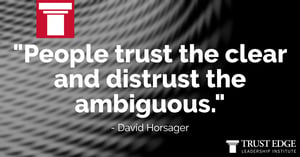
- Clarity
- Compassion – intent (mom is the most TRUSTED!)
- Character
- Competency (Example: Container Store trains its new employees 200 hours versus industry average of 8, see Chick Fil vs. McDonalds for another example)
- Commitment (We never rebuild trust with an apology, with a new commitment)
- Connection & Collaborate
- Contribution (Results)
- Consistency - Reputation – your brand
These are by no means in order – they’re all equal, yet Trust starts with clarity. Horsager sees massive change when Clarity occurs!
Horsager believes every leadership and organization issue can be solved with these 8 pillars
Someone in the audience mentioned communication as the biggest issue with trust. Horsager quickly offered communication is never the core issue.
Horsager also offered in the Q&A, character and commitment are harder to rebuild
POWERFUL LESSION - 3 Questions to Clarity
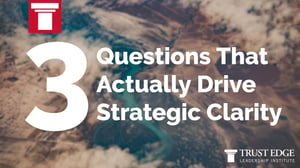 My customer, Matt Braun and I agreed the most powerful lesson for Horsager’s presentation were the 3 questions to clarity. He called it, “Give hope to get Action!”
My customer, Matt Braun and I agreed the most powerful lesson for Horsager’s presentation were the 3 questions to clarity. He called it, “Give hope to get Action!”
- How?
- HOW?
- HOW? (Final how must include the what, when, and where)
Accountability and the action steps to achieve this are keys to success with Trust. Horsager noted, if you have more than one person on the final task, it’s 50% more likely to not get it done. You must have one person accountable.
Ask How on that one thing until you build a habit
Ask how until you can do something differently today or tomorrow
Horsager emphasized you NEED TO BE CLEAR. 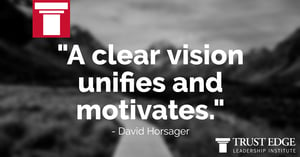
Horsager travels a lot. He asked HOW TO STAY SO FIT ON THE ROAD?
One way he decided was not to drink calories. He decided not to drink soda anymore when traveling.
The key is to achieve clarity by continuing to ask HOW until you will do it, today, or tomorrow.
Growth demands Strategic Discipline.
How can you build an enduring great organization?
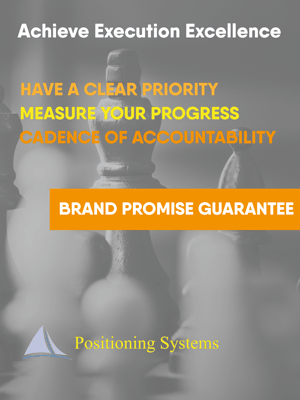 You need disciplined people, engaged in disciplined thought, to take disciplined action, to produce superior results, making a distinctive impact in the world.
You need disciplined people, engaged in disciplined thought, to take disciplined action, to produce superior results, making a distinctive impact in the world.
Discipline sustains momentum, over a long period of time, to lay the foundations for lasting endurance. It’s the framework for Good to Great:
- Stage 1: Disciplined People
- Stage 2: Disciplined Thought
- Stage 3: Disciplined Action
- Stage 4: Build Greatness
Positioning Systems is obsessively driven to elevate your teams Discipline. A winning habit starts with 3 Strategic Disciplines: Priority, Metrics and Meeting Rhythms. Your business dramatically improves forecasting, accountability, individual, and team performance.
-1.jpg?width=300&name=3%20Disciplines%20of%20Execution%20(Strategic%20Discipline)-1.jpg) Creating Execution Excellence demands creating/defining, understanding, with creativity and DISCIPLINE your Flywheel.
Creating Execution Excellence demands creating/defining, understanding, with creativity and DISCIPLINE your Flywheel.
Meeting Rhythms achieve a disciplined focus on performance metrics to drive growth.
Positioning Systems helps your business achieve these outcomes on the Four most Important Decisions your business faces:
|
DECISION |
RESULT/OUTCOME |
|
PEOPLE |
|
|
STRATEGY |
|
|
EXECUTION |
|
|
CASH |
|
We help your business Achieve Execution Excellence.
Positioning Systems helps mid-sized ($5M - $250M) business Scale-UP. We align your business to focus on Your One Thing! Contact dwick@positioningsystems.com to Scale Up your business! Take our Four Decisions Needs Assessment to discover how your business measures against other Scaled Up companies. We’ll contact you.
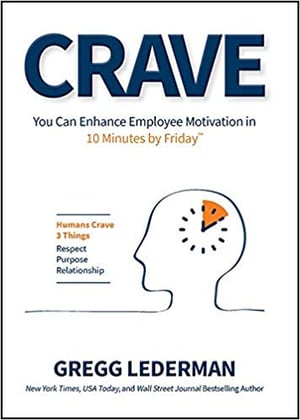 Next Blog: Achieve 91% EMPLOYEE ENGAGEMENT
Next Blog: Achieve 91% EMPLOYEE ENGAGEMENT
What if I said, you can Enhance Motivation in 10 Minutes by Friday? Gregg Lederman is an author, speaker, and CEO. Crave: You Can Enhance Employee Motivation in 10 Minutes by Friday have helped his customer achieve 91% employee engagement with his clients employees. Next blog will discover the 3 cravings all people have at work, and how to satisfy them in 10 minutes by Friday!




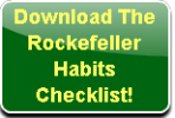

.jpeg?width=150&height=135&name=Hand%20with%20marker%20writing%20the%20question%20Whats%20Next_%20(1).jpeg)

